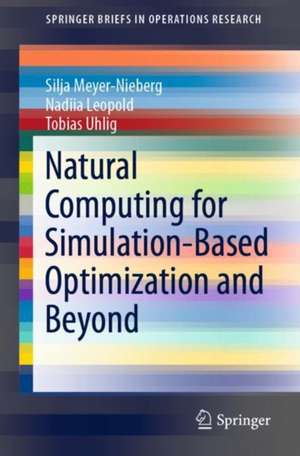Natural Computing for Simulation-Based Optimization and Beyond: SpringerBriefs in Operations Research
Autor Silja Meyer-Nieberg, Nadiia Leopold, Tobias Uhligen Limba Engleză Paperback – 7 aug 2019
This SpringerBrief bridges the gap between the areas of simulation studies on the one hand, and optimization with natural computing on the other. Since natural computing methods have been applied with great success in several application areas, a review concerning potential benefits and pitfalls for simulation studies is merited. The brief presents such an overview and combines it with an introduction to natural computing and selected major approaches, as well as with a concise treatment of general simulation-based optimization. As such, it is the first review which covers both the methodological background and recent application cases.
The brief is intended to serve two purposes: First, it can be used to gain more information concerning natural computing, its major dialects, and their usage for simulation studies. It also covers the areas of multi-objective optimization and neuroevolution. While the latter is only seldom mentioned in connection withsimulation studies, it is a powerful potential technique. Second, the reader is provided with an overview of several areas of simulation-based optimization which range from logistic problems to engineering tasks. Additionally, the brief focuses on the usage of surrogate and meta-models. The brief presents recent application examples.
Preț: 375.07 lei
Nou
Puncte Express: 563
Preț estimativ în valută:
71.77€ • 75.12$ • 59.74£
71.77€ • 75.12$ • 59.74£
Carte tipărită la comandă
Livrare economică 31 martie-14 aprilie
Preluare comenzi: 021 569.72.76
Specificații
ISBN-13: 9783030262143
ISBN-10: 3030262146
Pagini: 60
Ilustrații: VII, 60 p. 9 illus., 2 illus. in color.
Dimensiuni: 155 x 235 mm
Greutate: 0.11 kg
Ediția:1st ed. 2020
Editura: Springer International Publishing
Colecția Springer
Seria SpringerBriefs in Operations Research
Locul publicării:Cham, Switzerland
ISBN-10: 3030262146
Pagini: 60
Ilustrații: VII, 60 p. 9 illus., 2 illus. in color.
Dimensiuni: 155 x 235 mm
Greutate: 0.11 kg
Ediția:1st ed. 2020
Editura: Springer International Publishing
Colecția Springer
Seria SpringerBriefs in Operations Research
Locul publicării:Cham, Switzerland
Cuprins
Chapter 1. Introduction to Simulation-Based Optimization.- Chapter 2. Natural Computing and Optimization.- Chapter 3. Simulation-based Optimization.- Chapter 4 Conclusions.
Notă biografică
Silja Meyer-Nieberg is a postdoctoral researcher at the ITIS GmbH. She holds a Ph.D. degree in Computer Science from the Technical University of Dortmund and obtained her venia legendi in Computer Science at the Bundeswehr University Munich. Her research interests include modeling, simulation-based optimization, metaheuristics, and computational intelligence. She is a member of the IEEE and GI societies and serves currently in the Editorial Board of Applied Soft Computing.
Nadiia Leopold is a doctoral student at the Department of Computer Science of the Universität der Bundeswehr München, Germany and a researcher at the ITIS GmbH. She received her degree in computer science from the National Aviation University, Kyiv Ukraine. Her research interests include modeling and simulation, optimization, and data analysis.
Tobias Uhlig is a postdoctoral researcher at the Universitat der Bundeswehr Munchen, Germany. He holds an M.Sc. degree in Computer Science from Dresden University of Technology and a Ph.D. degree in Computer Science from the Universitat der Bundeswehr Munchen. His research interests include operational modeling, natural computing and heuristic optimization. He is a member of the ASIM and the IEEE RAS Technical Committee on Semiconductor Manufacturing Automation. He is one of the founding members of the ASIM SPL work group BeESPL. He is the author of Self-Replicating Individuals.
Caracteristici
Bridges the gap between the areas of simulation studies and optimization with natural computing First consideration of evolutionary data farming and digital games in simulation-based optimization Examines the use of behavioral and controller learning in simulation









